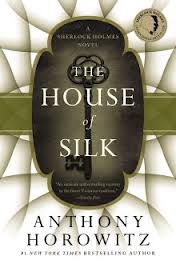The House of Silk—Anthony Horowitz
It is curious to reflect now, at the very end of my writing career, that
each and every one of my chronicles ended with the unmasking or the arrest of the
miscreant, and that after that point, almost without exception, I simply
assumed that their fate would be of no further interest to my readers and gave
up on them, as if it was their wrongdoing alone that justified their existence
and that once the crimes had been solved they were no longer human beings with
beating hearts and broken spirits. (155)
We seem to be in a phase of
reincarnating Sherlock Holmes, much like our re-obsession with vampires. The
powers-that-be see that something works once and then decide to milk it
forever. In this particular instance, I’m not annoyed. With regard to all of
the film and television media, I can find something redeeming in each iteration
of Holmes that I see. With the Holmes of Robert Downey, Jr. you get…well,
Robert Downey, Jr. In all of his snarky, ridiculous, wonderful glory. With the
BBC’s Sherlock, you get Benedict
Cumberbatch (I challenge you to find someone with a better name), who is
brilliant as a modern-day Holmes, and was perhaps born to play the role of the un-self
conscious, socially inappropriate, imminently observant consulting detective.
(And Martin Freeman is wonderful as sidekick Watson.) With the new CBS version,
Elementary, you get Jonny Lee Miller
and his tattoos. Okay, there’s more to him than that. He’s wonderful as
Sherlock, in another modern day take on the old classic. I mean, really, you
can’t go wrong. Perhaps it’s because Conan Doyle provided such a marvelous
foundation. And let’s be honest, you really can’t go wrong with a British
accent. While we’re on the subject,
Amazon Kindle just released The Complete
Sherlock Holmes for free. You can’t do better than that. Even if you weren’t
planning on reading it anytime soon. I take things that I don’t even want if
they’re free, so I say, go for it.
This is the first print version of Holmes
that I’ve read which was not written by Conan Doyle - at least as far as I can remember – and I
have to say, I was impressed. I had just finished reading a slew of young adult
novels, which may have contributed to the refreshing change of tone. But even
with that in mind, this book was a triumph compared to other contemporary works;
maybe because it is a recall to a more refined time. As I’ve mentioned before,
one of my biggest pet peeves is the laziness of modern writers, the lack of
interest in utilizing exposition and instead having characters express details
in dialogue in the simplest of terms. (Note: I’m not saying that I can do any
better, but I’m also not trying to have my writing published. That’s why I
stick with a free internet blog that nobody ever looks at.) The House of Silk was as much the
opposite of that as any book could be, which may have lent itself to creating a
more realistic follow-up to the Conan Doyle canon. I am no expert, but in my
mind, Horowitz artfully imitates the style and tone of the novels and detective
stories of the 1800s, and especially those of the familiar Holmes stories.
The bulk of this story has been
written shortly after Holmes has died, as Watson tells us at the start of the story.
He tells us that the case was of such a nature that it would have been impossible
for him to have told it any time before that point, and it becomes apparent why
that is true. The two cases that Sherlock is working on in The House of Silk, seemingly unconnected, of course end up being greatly
related. Watson relays the story of an art dealer, Edmund Carstairs, who comes
to Sherlock, looking for assistance. He believes that he is being followed by a
man who he thought was killed while he was in America attempting to track down
some stolen artwork. While working on that case, Sherlock is sent down another
road when one of the hooligans he has hired to help him track down the man is
viciously beaten and murdered. Indeed, the case becomes so serious, and the duo
are on the trail of something much bigger than they realize, that a conspiracy takes
place and Sherlock is arrested for murder. (Of course, he is innocent.) The end
point does end up being a bit disturbing, although thankfully not graphically
so. It has the typical Holmes-ian ending, in which he explains how he came to
the correct conclusion, and you feel as though you should have seen it all
along.
The writing was so well done. I
thought that Holowitz did a remarkable job of capturing the naked egotism, the
childlike and unabashed frankness that is the somehow loveable Sherlock Holmes.
A wonderful, stimulating read.



Comments
Post a Comment